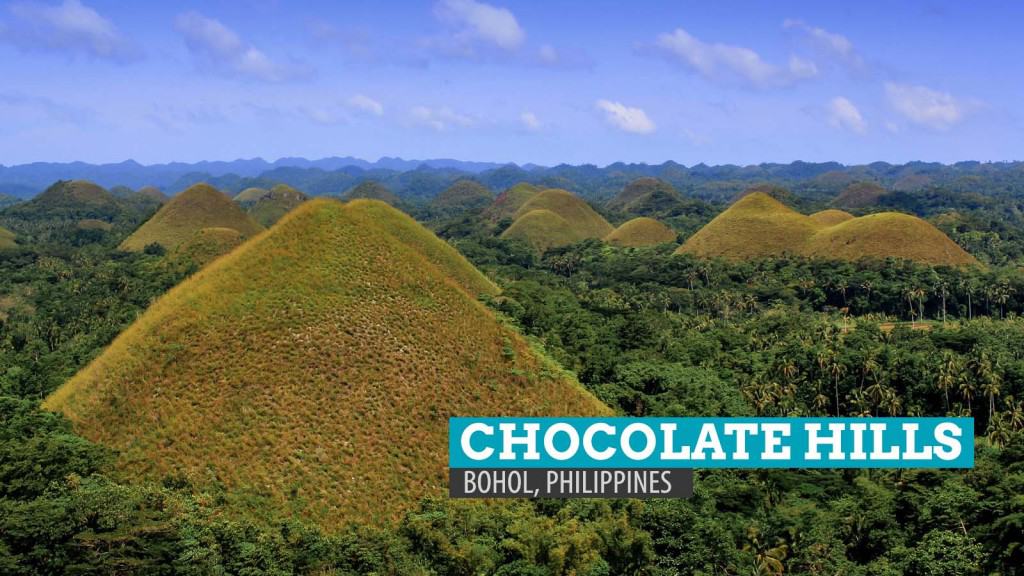Once upon a time, when giants roamed the earth, two giants had a great fight for reasons that remain obscure. The two hurled rocks and dirt at each other for days that the battle exhausted them so terribly that they just agreed to become friends. This is how the Chocolate Hills was formed.
According to legend, that is.
It was one of the stories that fascinated me when I was a child. In grade school, our books and teachers fed our young minds with legends explaining how things and places came to be. The Chocolate Hills was one of them. In Bohol, however, there are a few more legends that attempt to explore the origins of the hills. Some are more romantic, others are humorous. All of them involve giants, even giant carabaos in one. The version that I was told explained the formation not just of these kisses-shaped hills but also the other great attractions in the Philippines like Mt. Apo in Mindanao and the Hundred Islands in Pangasinan. Not that I believe any of them, I’m too old for giants and legends.
The inner child in me, however, was drowning in glee as we drove to the Chocolate Hills from Bilar. Along with the Mayon Volcano and the Banaue Rice Terraces, it is one of the first tourist spots in the Philippines that I became familiar with. Suffice to say that being in the middle of the site, surrounded by thousands of these giant mounds, was a dream come true.
Although these are not fudge-like at all, these hills are still jaw-dropping! It is an unusual, natural structure in the heart of the Bohol island. There are 1,268 karst hills throughout the 20-square mile area, covering the towns of Carmen, Batuan and Sagbayan. The hills are both symmetrical and conical and may be 100 to 400 feet tall. Although these grass-covered hills are usually green, they turn brown during summer (dry season) making it earn its name “Chocolate Hills.”
The entire site used to be underwater. In fact, there are many fossils of different shallow marine lifeforms such as corals, mollusks and algae that can be found in the hills. Over time, hills were exposed. I’m not sure whether it was because the land rose or the water receded or both.
There’s a viewing area on one of the hills where you can park your vehicle. There are also souvenir shops in the area. But you will still have to climb an almost never-ending staircase to get to the top of the hill, which will give you an awesome view.
I had been to this spectacular site three times and each time, the weather condition was different. My first time, the middle of June — it was raining. I wasn’t able to stay longer at the viewdeck to admire the scenery. The second time was early July and it was almost sunset, which gave the place a more surreal, fantastic feel. The grass on both occasions were bright and green. The last time was in the middle of summer and the hills were the most chocolatey that I had seen. It was hot and sunny and the king sun was trying to fry everyone under it. Of the three, the sunset visit was the most unforgettable.
The Chocolate Hills is on the Tentative List of UNESCO World Hetitage Sites. It was officially submitted in 2006 as the Chocolate Hills Natural Monument and is being considered for nomination. In the Philippines, it has already been declared a National Geological Monument in 1988 for its “scientific value and geomorphic uniqueness.”
Updated: 2013 • 4 • 25
Posted: 2011 • 1 • 8
How to get to Chocolate Hills: From Tagbilaran airport, you can catch a trike to the Tagbilaran Bus Terminal located in Dao District. Board a bus going to Carmen (fare is around P100) and ask the driver to drop you off at the Chocolate Hills complex. It’s a 10-minute walk up to the complex from here. Chocolate Hills is also included in many countryside tours that are offered by various hotels and travel agencies. The countryside tour also stops at other major attractions in Bohol such as Loboc Cruise, Man-made Forest, and Baclayon Church.
